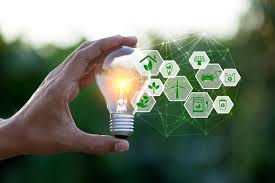Energy Efficiency
Introduction to Energy Conservation and Efficiency
Energy conservation and efficiency are more than just buzzwords—they are
powerful tools that can significantly reduce energy consumption and
protect the environment. By making both small and large adjustments in
our daily lives and utilizing technology that requires less energy, we
can save on energy bills and contribute to a more sustainable future.
Energy-Efficient Technologies
Energy-efficient technologies
are designed to perform tasks using less energy without compromising
effectiveness. For instance, LED lights consume less electricity than
traditional incandescent bulbs while providing the same level of
illumination. Additionally, LED lights are more durable and last longer,
making them a cost-effective and environmentally friendly choice.
Similarly, energy-efficient appliances, such as refrigerators, washing
machines, and air conditioners, are engineered to use less energy while
maintaining their performance. Although these appliances may have higher
upfront costs, they ultimately save money through reduced energy bills
over time.
The Role of Habits in Energy Conservation
Energy conservation is not solely reliant on technology—it also involves
our daily habits. Simple actions like turning off lights when leaving a
room, using natural light during the day, or setting computers to sleep
mode when not in use can make a significant impact. Many electronic
devices continue to draw power even when turned off, a phenomenon known
as "phantom load" or "vampire power." By unplugging these devices or
using power strips to turn them off completely, we can further reduce
unnecessary energy consumption.
Energy Conservation Habits
| Habit | Action | Impact | |
| Turning off lights | Turn off lights when leaving a room | Reduces unnecessary energy consumption | |
| Using natural light | Maximize use of daylight during the day | Lowers the need for artificial lighting | |
| Unplugging devices | Unplug electronics or use power strips to fully turn them off | Reduces phantom load or vampire power | |
| Setting computers to sleep mode |
|
Saves energy and extends device lifespan |
Smart Grids and Smart Meters
Smart grids represent an advanced approach to managing energy use. These grids utilize digital communication technology to control how electricity is distributed and consumed, thereby improving the efficiency and reliability of energy distribution. Smart grids can also integrate renewable energy sources more effectively, balancing supply and demand in real-time.
Smart
meters,
which provide detailed information about energy consumption, empower
consumers to identify and reduce waste. By offering insights into energy
usage patterns, smart meters help households and businesses make
informed decisions about energy conservation.
Importance of Public Awareness and Education
While technological solutions are vital, public awareness and education
about energy conservation are equally crucial. Imagine a world where
everyone is knowledgeable about how to save energy at home, school, and
work. This widespread understanding could lead to significant behavioral
changes, resulting in a substantial reduction in energy consumption.
Schools, for example, can adopt energy-saving practices such as
utilizing natural light, setting computers to sleep mode, and
encouraging students to participate in energy-saving competitions.
Environmental and Economic Benefits
Both energy conservation and efficiency contribute to reducing energy
bills and minimizing environmental impact. By decreasing energy
consumption, we reduce the demand for fossil fuels, which in turn lowers
greenhouse gas emissions and air pollution. This effort is essential in
combating climate change and protecting natural ecosystems. Furthermore,
energy efficiency measures can diminish the need for new power plants
and infrastructure, saving money and minimizing environmental
disruption. A more efficient energy system is also more reliable, with
reduced risks of blackouts and better energy availability when and where
it is needed.
Environmental and Economic Benefits
|
Benefit |
Description |
Result |
|
Reduced Greenhouse Gas Emissions |
Decreasing reliance on fossil fuels |
Combats climate change and protects ecosystems |
|
Lower Energy Bills |
Using less energy and improving efficiency |
Saves money over time |
|
Reduced Need for New Infrastructure |
Less energy demand means fewer new power plants and infrastructure |
Minimizes environmental disruption and costs |
|
Improved Reliability |
More predictable and stable energy supply |
Reduces risk of blackouts and ensures availability |
Long-Term Impact and Sustainable Energy Transition
In the long term, focusing on energy conservation and efficiency
supports the transition to a more sustainable energy system. This system
will increasingly rely on renewable energy sources while minimizing
environmental harm. A lower and more predictable energy demand makes it
easier to maintain a stable and efficient power supply, ensuring a
reliable energy future for all.
